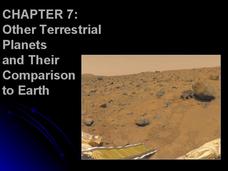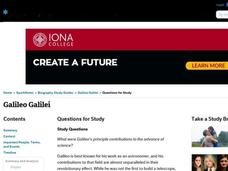Glynn County School System
Earth's Magnetic Field and the Moon
The surface of the moon has an amazing tale to tell. Learn about the moon's story with a PowerPoint presentation that describes the unique features of the moon's surface as well as explains its movement in relation to Earth.
EngageNY
The Motion of the Moon, Sun, and Stars—Motivating Mathematics
What does math have to do with the behavior of the earth and sun? Learn how the movement of celestial bodies has influenced the development of trigonometry. Scholars connects the details in mathematics to their...
American Museum of Natural History
Beyond Planet Earth
Scholars take a journey through space with 16 eye-catching images. Along the way, learners read captions starting with the moon, then move onto asteroids, Mars, and Jupiter.
EngageNY
How Far Away Is the Moon?
Does the space shuttle have an odometer? Maybe, but all that is needed to determine the distance to the moon is a little geometry! The lesson asks scholars to sketch the relationship of the Earth and moon using shadows of an eclipse....
American Museum of Natural History
Field Trip Mars
Fly around the Martian surface. Pupils view a presentation on the planet Mars featuring a flyover that shows different views of the surface where rovers have landed and explored on different missions. As individuals watch the images, the...
Curated OER
The Moon
In this space science worksheet, learners complete each of the statements with the correct word or phrase about the moon. Then they identify four ways that scientists believe the moon was formed, selecting one and writing a paragraph...
Curated OER
Mesopotamian Gods: Handout
Ancient religion was often times closely linked to social structure and government. Hand out a handy guide that describes 12 major gods and goddesses from ancient Mesopotamia. They are each connected to a location, symbol, and force of...
Curated OER
The Moon Book
For this moon worksheet, students read the book The Moon Book and list facts about the moon and draw eclipses. Students list 10 facts and draw 3 kinds of eclipses.
Glynn County School System
Light, History, Gravity, Distance, Relativity, and Space-Time
Let the star's color be the guide! The color of a star indicates its temperature and its mass and distance affect the gravitational force. The lesson presentations address these concepts as well as how the theory of special relativity...
Curated OER
Planets
In this planets worksheet, students read about Mercury, Venus, and Earth and then complete 21 multiple choice, 2 true or false, and 1 short answer question.
Curated OER
Mesopotamian Gods and Goddesses
Each of the Mesopotamian Gods and Goddesses are associated with a city and a symbol. This hand out is intended as a quick reference guide to help learners recall 12 of the most prominent of these figures.
Curated OER
Galaxies and the Universe
If Earth was formed 4600 million years ago, and the sun revolves about the center of the Milky Way once every 250 million years, how many revolutions have occurred? Students answer this question and ten more, all providing students with...
University of Colorado
Space Travel Guide
Neptune takes 164.8 Earth years to travel around the sun. In the fifth of 22 lessons, young scientists create a travel guide to a planet in our solar system. They provide tips for others on what to bring, what they see, and their...
Glynn County School System
Terrestrial Planets
Mercury, Venus, Earth, and Mars are collectively known as the terrestrial planets. Although part of the same group, each planet has its own set of characteristics. Scholars explore the characteristics that make the planets unique and...
Messenger Education
Exploring Exploring
The reason people first began trading was because of their desires for objects other societies possessed. In the activity, classes discuss why exploration has been a common thread in all societies and where these desires have taken...
Curated OER
Galileo Galilei Questions for Study
In this online interactive philosophy instructional activity, students respond to 10 short answer and essay questions about Galileo's contributions to science.
Curated OER
How Often?
In this social studies worksheet, students answer 24 questions about a variety of social studies questions. Students are divided up into two teams and the first team to answer a question correctly gets a point.
Education World
Every Day Edit - Pluto, the Dwarf Planet
In this everyday editing instructional activity, students correct grammatical mistakes in a short paragraph about the planet Pluto. The errors range from punctuation, capitalization, spelling, and grammar.
TLS Books
Uranus
After reading an informational text passage, learners answer four multiple choice questions about the third largest planet in our solar system.
International Technology Education Association
Dampen That Drift!
The spacecraft is drifting too far off course! Two games help explain how a spacecraft can use its thrusters to maintain its position. The games have pupils be the components of vectors in order to create and counteract the...
American Museum of Natural History
What is Astronomy?
Go study the universe. Pupils learn seven aspects about astronomy and astronomers. They begin to learn about constellations; distance and motion between objects; gravity; the electromagnetic spectrum; dark matter and energy; and teams of...
American Museum of Natural History
A Closer Look at Mars
A website looks at how we know so much about Mars—telescopes, robots, and spacecraft—and the search for martian life. Following the informational text are three questions that quiz pupils about possible life on Mars.
Curated OER
Mixed Prepositions 13
In this prepositions online interactive worksheet, students choose the multiple choice preposition in 10 drop down boxes that completes each sentence grammatically correct. Students check their answers online when completed.
Curated OER
NASA Anniversary
In this NASA Anniversary worksheet, students complete activities such as reading a passage, phrase matching, fill in the blanks, correct words, multiple choice, spelling, sequencing, scrambled sentences, writing questions, survey, and...























